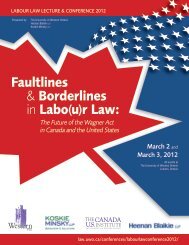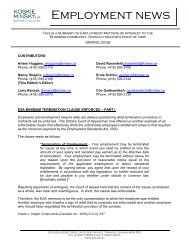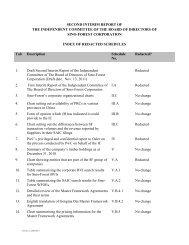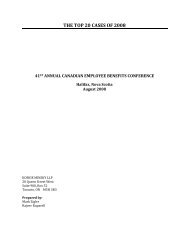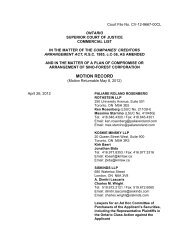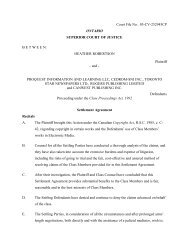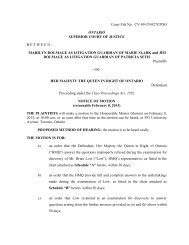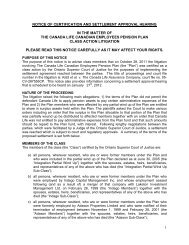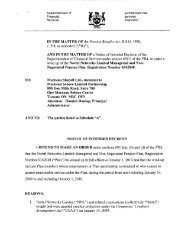Labour Injunctions & Cease and Desist Orders in Ontario
Labour Injunctions & Cease and Desist Orders in Ontario
Labour Injunctions & Cease and Desist Orders in Ontario
You also want an ePaper? Increase the reach of your titles
YUMPU automatically turns print PDFs into web optimized ePapers that Google loves.
[9]<br />
Therefore, while section 102(3) of the Courts of Justice Act provides that the courts may<br />
issue <strong>in</strong>junctions <strong>in</strong> relation to labour disputes, the judicial reason<strong>in</strong>g <strong>in</strong> Industrial Hardwood <strong>and</strong><br />
Cancoil <strong>in</strong>dicates that the courts will likely exercise restra<strong>in</strong>t <strong>in</strong> order<strong>in</strong>g <strong>in</strong>junctions.<br />
Furthermore, as <strong>in</strong>dicated <strong>in</strong> Industrial Hardwood, where <strong>in</strong>junctions are ordered, they will likely<br />
not go farther than is necessary to address the harm at issue.<br />
(ii)<br />
The RJR-MacDonald Test<br />
In addition to the criteria provided for <strong>in</strong> section 102(3) of the Courts of Justice Act, the<br />
test from RJR-MacDonald Inc. v. Canada (Attorney General) 19 (“RJR-MacDonald”) must be<br />
satisfied <strong>in</strong> order for an <strong>in</strong>junction to be issued <strong>in</strong> a labour dispute. RJR-MacDonald requires that<br />
the party seek<strong>in</strong>g an <strong>in</strong>junction establish the follow<strong>in</strong>g:<br />
(1) there is a serious question to be tried,<br />
(2) the pla<strong>in</strong>tiff will suffer irreparable harm which cannot be adequately compensated<br />
by damages, <strong>and</strong><br />
(3) that the balance of convenience favours grant<strong>in</strong>g the <strong>in</strong>junction.<br />
S<strong>in</strong>ce the Pepsi-Cola decision, <strong>Ontario</strong> courts have generally found that the three<br />
elements of the RJR MacDonald test are satisfied <strong>in</strong> a dispute relat<strong>in</strong>g to picket<strong>in</strong>g activity when<br />
it appears that there is sufficient evidence upon which tortious or crim<strong>in</strong>al liability may be found.<br />
For this reason, there is often little dispute over whether the picket<strong>in</strong>g activities be<strong>in</strong>g<br />
compla<strong>in</strong>ed of raise a serious question to be tried under the first branch of the RJR-MacDonald<br />
test. With respect to the second branch of the test, courts have consistently found that irreparable<br />
19 RJR-MacDonald Inc. v Canada (Attorney General), [1994] 1 SCR 311.




